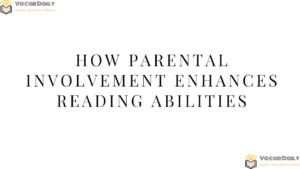How Parental Involvement Enhances Reading Abilities
Parental involvement is a cornerstone of successful literacy development in children. Parents serve as role models and provide the support and encouragement necessary for cultivating strong reading skills. This article delves into the ways parental involvement enhances reading abilities, with actionable strategies to empower families in their children’s literacy journey.
The Impact of Reading Aloud
Reading aloud is one of the most powerful ways parents can foster a love for reading. It introduces children to new vocabulary, builds comprehension skills, and enhances listening abilities. The interactive nature of reading aloud—discussing characters, predicting outcomes, and asking questions—engages children and deepens their understanding of stories.
Regular read-aloud sessions expose children to various genres, encouraging them to explore different themes and writing styles. Moreover, it helps young learners associate reading with positive emotions, laying the foundation for lifelong literacy.
Creating a Literacy-Rich Home Environment
A home filled with books and reading materials sends a clear message about the value of literacy. Parents can create a literacy-rich environment by providing age-appropriate books, magazines, and educational games. Having a designated reading space encourages children to engage with books regularly.
In addition to physical resources, parents can incorporate literacy into daily routines. Reading recipes, writing shopping lists, or labeling household items offer practical opportunities for children to practice reading and writing skills in real-life contexts.
Parental Modeling of Reading Habits
Children learn by example, and parents who demonstrate a love for reading inspire their children to follow suit. Modeling reading behaviors—such as setting aside time for reading, discussing books, or visiting the library—reinforces the importance of literacy.
Sharing personal reading experiences or engaging in family reading activities, like book clubs or story-sharing nights, fosters a sense of community around reading. These activities emphasize that reading is not just a school task but a lifelong pursuit.
Collaborating with Educators
Collaboration between parents and educators enhances literacy outcomes. Parents can support their children’s learning by staying informed about classroom activities, attending parent-teacher conferences, and reinforcing lessons at home. Understanding the curriculum enables parents to align their efforts with school-based instruction.
Volunteering in classrooms or participating in school literacy events, such as book fairs or reading challenges, strengthens the home-school connection and motivates children to engage in reading activities.
The Role of Technology in Parental Involvement
Technology provides innovative ways for parents to support their children’s literacy. Educational apps, e-books, and online resources offer interactive and engaging reading opportunities. Parents can explore these tools together with their children, making the learning process enjoyable and collaborative.
However, it is crucial to balance screen time with traditional reading activities. Parents should guide their children in selecting high-quality digital content that aligns with educational goals and promotes active learning.
For additional tips and tools to enhance reading abilities, visit VocabDaily. Explore the VocabDaily Workbook for practical activities that support parental involvement in literacy development.


Leave a Reply